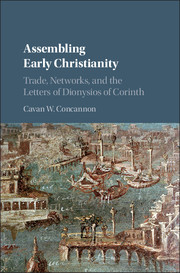
-
Select format
-
- Publisher:
- Cambridge University Press
- Publication date:
- 05 September 2017
- 07 September 2017
- ISBN:
- 9781108155373
- 9781107194298
- Dimensions:
- (228 x 152 mm)
- Weight & Pages:
- 0.54kg, 274 Pages
- Dimensions:
- Weight & Pages:
- Subjects:
- Religion, Church History, Theology
You may already have access via personal or institutional login- Subjects:
- Religion, Church History, Theology
Book description
In this book, Cavan W. Concannon explores the growth and development of Christianity in the second century. He focuses on Dionysios of Corinth, an early Christian bishop who worked to build a network of churches along trade routes in the eastern Mediterranean. Using archaeological evidence, and analysing Dionysios' fragmentary letter collection, Concannon shows how various networks and collectives assembled together, and how various Christianities emerged and coexisted as a result of tenuous and shifting networks. Dionysios' story also overlaps with key early Christian debates, notably issues of celibacy, marriage, re-admission of sinners, Roman persecution, and the economic and political interdependence of churches, which are also explored in this study. Concannon's volume thus offers new insights into a fluid, emergent Christianity at a pivotal moment of its evolution.
Reviews
'Deftly employing a variety of investigative strategies and cutting-edge resources, Cavan W. Concannon in this insightful study not only provides the most comprehensive analysis ever written of the enigmatic bishop Dionysios of Corinth but also uses him as a window to illumine the second-century-CE world in all of its manifold cultural and theological complexity.'
John T. Fitzgerald - University of Notre Dame, Indiana
'Assembling Early Christianity will become the standard study of Dionysios of Corinth for the foreseeable future. Cavan W. Concannon ably illuminates the evidence by providing extremely erudite contextual analysis, while also making use of imaginative historical reconstruction in a way that is judicious and balanced. Furthermore, he proposes an innovative and theoretically astute historiographical model for approaching earliest Christianity in all of its complexity and variety.'
Benjamin H. Dunning - Fordham University, New York
'Concannon’s use of connectivity and assemblage is a model for scholars who hope to eradicate the binaries, labels, and categories that have stagnated and misdirected the field of early Christian studies. But that minor key of dissolution also tantalized me, embracing disintegrated relationships and faded traces as phenomena that demand attention. The life of the historian is a reckoning with estrangement. Concannon shows how disintegration and traces are themselves points of connection between the past and the desirous historian.'
Sarah F. Porter Source: Ancient Jew Review
Contents
Metrics
Altmetric attention score
Full text views
Full text views help Loading metrics...
Loading metrics...
* Views captured on Cambridge Core between #date#. This data will be updated every 24 hours.
Usage data cannot currently be displayed.
Accessibility standard: Unknown
Why this information is here
This section outlines the accessibility features of this content - including support for screen readers, full keyboard navigation and high-contrast display options. This may not be relevant for you.
Accessibility Information
Accessibility compliance for the PDF of this book is currently unknown and may be updated in the future.


